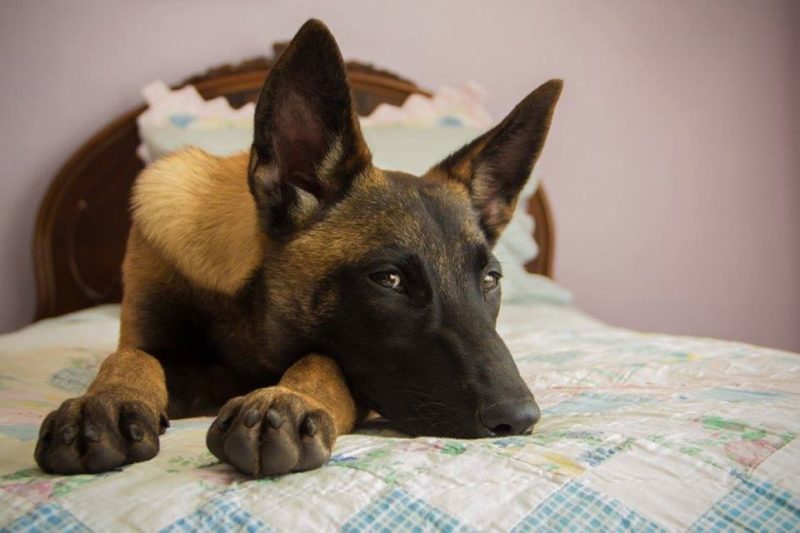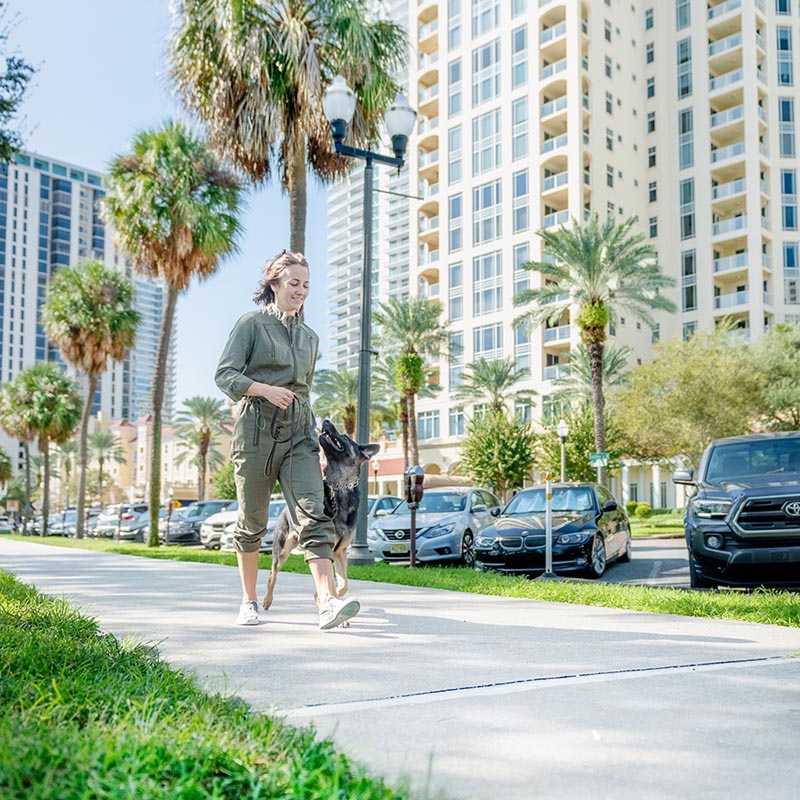We are excited to be part of your puppy’s obedience journey. We like to wait until the puppy is at least six months before starting formal training, but there are plenty of exercises and skills you can work on during this time. You want to be stimulating your pup and teach them acceptable behaviors and constructive games to play with you.
Here are some tips and references to start your puppy off on the right paw:
- Obedience and Play sessions should be short, frequent sessions rather than one big long one. Puppies have short attention spans and small stomachs, so more extensive training sessions will be less effective.
- Use treats or their food to practice luring sit and down positions. You can also reward the puppy on a dog bed or Kuranda bed with treats so that the pup associates it as a positive place to hang out.
- Use meals as training rewards. Please don’t feed your pup in their dog bowl. Use that meal and teach the puppy to come, sit, down, or go to their place. Remember to keep reward random and sometimes give your dog “jackpots” for exceptional behavior (behaviors under high distraction, etc.)
- This is a critical age for socialization. Your puppy should see new people, dogs, environments, and other real-world things they will encounter. Ensure you avoid high dog traffic areas (dog parks) until fully vaccinated (unless you know the dogs and are all vaccinated). Having controlled playdates is optimal. And we don’t suggest having the pup meet random dogs on leash. Greetings like this can be very intimidating for them.
- When calling your pup away from something they were doing, be sure to use their name before the command. Periodically reward them for just turning to look at you when you say their name. Try not to associate their name with the No marker!
- For mouthing, give a “no” marker and then redirect your puppy to a toy. Call us right away if the puppy starts guarding toys or growling when you approach to take a toy.
- Whenever you are working on the sit and down positions during obedience, make sure that you release the pup with “OK.” That is the signal they can get up from that position. Please do not allow the dog to free themselves. Have them remain in the position and not just pop right out of it.
Crate Manners
- The command to go in the kennel is “kennel.” If the pup needs some help, you can point to the crate’s open door or throw some treats inside.
- When opening the door, you can give the pup the command “wait” and then open the door. If the puppy bolts out, close the door, stopping them from bolting out. If they do manage to bolt out, put them back in, and repeat the sequence. When the puppy learns to wait to come out patiently, you can then tell them “OK” to come out.
- Periodically practice putting the pup in and out of the crate even when you are home. Then the dog won’t always associate the crate with being there for long periods.
- Feed your puppy one of their meals in their crate to discourage potty accidents inside.
- Do not reward crying in the crate by letting the puppy out. Wait for the puppy to be quiet, and then release out.
- Crates should be big enough for the puppy to stand and lay down comfortably. You can get a crate with a divider to ensure you will always have one of the right sizes.
House Breaking
- The big times to take your puppy out are after waking up, active play, eating, and drinking.
- When you can’t supervise your pup directly, put them in their crate or an x-pen so that they can’t sneak off and potty somewhere else in the house.
- Make a big deal whenever your pup potties outside, and reward them heavily. Make sure they finish pottying before starting the celebration.
- A good rule of thumb is that a puppy can hold it for the same number of hours as their age in months +1. So a 3-month-old puppy can practically control their potty for 4 hours. This estimate may vary from puppy to puppy.
Toys
- Your puppy should start to learn how to play with toys and play with you.
- If you want to use a toy to retrieve, the best ones to use are size-appropriate squeaky balls or Kong Wubbas. Retrieve is a great bonding exercise to teach your pup.
- For tug games, use rope toys (Recommended brand Itza tug) or a chamois (can get at the auto supply store, or a leather bite rag from Leerburg.com).
- Keep chewing toys separate from retrieving and tug toys, which should all be about interacting with you.
- Teething is a challenging stage, so have plenty of toys available, and your pup should have a designated toy box. Remember that the puppy is uncomfortable during this time. You can also give them ice to crunch!
- It is never OK for the pup to chew on you or the family. A firm NO and redirection to the toy is the best method.
Ways to Burn Your Puppy’s Energy
- Walks
- Hide and Seek
- Playing with Tug/Chamois
- Playing Retrieve
- Busy time with stuffed Kong, interactive toys, etc.
- Playing with appropriate dogs
- Socialization in new environments
A checklist for you to work on before you send your puppy to the Full-Service Training at The Doghouse when they are six months:
- Has a positive association with the members of your family
- Has the following mannerisms: doesn’t jump, mouth, whine/bark when alone.
- Knows what a retractable leash is and can go on a walk (not formal)
- Knows their name and the command to come. Knows the hide and seek game to find you. Has restrained recalls
- Travels well in a vehicle
- Your pup is indifferent in public places like coffee shops, outdoor parks, loud environments, outside restaurants.
- Use interactive toys to feed puppy meals.
- Will accept brushing, ear cleaning, teeth cleaning.
- You can pick up your pup, feet touched, restrained with no mouthing or squirming.
- Will sit and down for treats
- Will eat meals in her place or their crate.
- Doesn’t run out the crate door until released with OK
- Can be behind a baby gate with interactive toys
- Can play the game of retrieve in a few different locations
- Meets dogs outside of your pack (but safe dogs that you know)
- Understands the release work OK is followed with food or praise
Congrats again on your new addition. If you are struggling in any area, please feel free to contact us at the kennel (727)201-9790, and we can guide you or set up a private lesson to help bridge the gap before they come for training.
Here is a link to more puppy training tips: https://thedoghousellc.com/dog-training-tips/
Enjoy this time, and remember these pups grow up fast!



